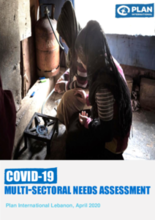Plan International Lebanon’s multi-sectoral needs assessment is designed to determine priority needs and risks as a result of the COVID-19 outbreak in Lebanon, and to guide current and future programming that serve the most vulnerable children and communities in Lebanon affected by the outbreak, particularly adolescent girls and boys and their families.
Specifically, the assessment looks at the impact of the coronavirus across sectors, and covers the following governorates where Plan International currently implements programmes: Akkar, North Lebanon, Nabatieh, South Lebanon, and Baalbek-Hermel
Data was collected from 13 - 17 April 2020 through remote surveys with a total of 620 caregivers and 498 adolescent girls and boys in several governorates.
The surveyed population is equally divided between female and male respondents and between Syrian and Lebanese populations in each of the governorates in order to gain evidence on the unique risks to each group.
The report presents insightful findings on the effects of the COVID-19 outbreak, highlighting data collected on COVID-19 knowledge, health, WASH, protection, education, food security and livelihoods, shelter, movement and digital access. Among the findings, the report notes that adolescents are at higher risk of violence and abuse.
It shows how the pandemic has severely impacted both vulnerable Lebanese and Syrian refugees at a time when the country is experiencing its worst economic crisis in years.
The outbreak is also compounding gender inequalities, with alarming effects on adolescent girls who are often struggling with “invisible” consequences on their lives.
Finally, the report provides recommendations for various actors to take into account when planning or implementing a response to ensure that the needs of the most affected groups, including adolescent girls, are met. Among these recommendations, the report calls for the provision of parenting support to caregivers, with a focus on self-care and positive parenting styles specific to younger and older adolescents, to prevent the increase of violence against children, including girls.

